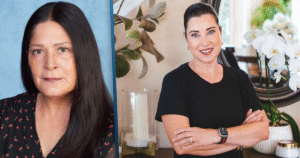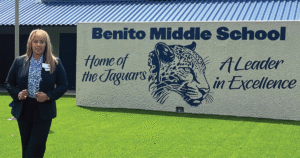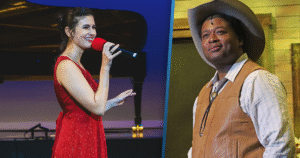
By Kelly Miller
With the cost of medical treatments skyrocketing, it can be difficult for a family to meet the financial obligations of mounting bills when they have a child who has long-term medical needs. That’s why it’s so amazing that Shriners Hospitals for Children-Tampa® (Shriners Hospital) accepts all children, regardless of the family’s ability to pay.
Shriners Hospitals for Children® is a one-of-a kind pediatric health care system made up of 22 hospitals dedicated to improving the lives of children through specialized treatments, innovative research and outstanding teaching programs. The Tampa location, which opened in 1985, is off Bruce B. Downs (BBD) Blvd. on the University of South Florida’s Tampa campus in the Research Park and specializes in orthopaedic conditions, but also assists children with post-operative burn care. (Other locations deal with spinal cord injuries and cleft lip and palate.)
Shriners International, a fraternal group and branch of the Freemasons, runs the Shriners Hospitals organization. There are more than 200 chapters of Shriners across North and South America, Europe and Asia, although its international headquarters is right here in Tampa. According to its website, Shriners International describes itself as a fraternity based on fun, fellowship and the Masonic principles of brotherly love, relief and truth. Although women still can not become Shriners, there also are several organizations for women that support the fraternity and philanthropy of Shriners.
Through a family-centered environment, Shriners Hospital Tampa is dedicated to providing medical and rehabilitative services to children from birth to 18 years old that have congenital deformities and conditions, problems resulting from orthopaedic injuries and diseases of the neuromusculoskeletal system. Specific conditions include:
• Club foot
• Hand disorders
• Limb deficiencies/discrepancies
• Legg-Calvé-Perthes disease and other hip disorders
• Scoliosis (curvature of the spine)
• Osteogenesis imperfecta (brittle bone disease)
• Orthopaedic problems associated with cerebral palsy and spina bifida
Fourteen-year-old Lutz resident Leigh Dittman was diagnosed with osteogenesis imperfect, which causes her bones to be very weak and fragile, when she was an infant. The Tampa Shriners Hospital has taken care of Leigh since she was a newborn. Her mother Ellen Dittman says, “The doctors, nurses and staff helped us learn how to handle Leigh with broken bones, surgeries, IV treatments and more than anything, gave us a listening ear. Sometimes the journey can get a little bumpy, but with the help of Shriners, there is always the help we need to keep going. Their medical expertise has helped my daughter have a better life.”
Because of the wonderful care Leigh’s received, the Dittman family (Leigh, Beth, and David) is determined to help other children who need the services of Shriners Hospitals. As Beth says, “Without Shriners, we don’t know where we would be today.” The Dittmans are on a quest to raise $1 million dollars. They’ve already raised $570,000 dollars and hope you can help them get one step closer to reaching their goal by attending the 11th annual Leigh Dittman Charity Fund Raiser on Saturday, September 20, 5:30 p.m., at the India Cultural Center (5511 Lynn Rd.) in Tampa. The evening will include food, drinks, raffles, and live and silent auctions. (For more info, call Jamie Santillo at 972-2250.)
A Calm, Tranquil Environment
More than 50,000 children have received orthopaedic specialty care from the Tampa Shriners Hospital since it opened almost three decades ago. With a history of zero-percent infection rate, it’s easy to see why families from all over the country seek out the hospital.
It also could be because Shriners Hospital Tampa has an in-house orthotics and prosthetics (O & P) department known as POPS (Pediatric Orthotic & Prosthetic Services) that evaluates, fabricates and custom fits artificial limbs and orthopaedic braces. The department uses cutting-edge technology that includes a high-tech movement analysis lab that uses a system of reflective markers, high-speed cameras and computers to develop a model of a child’s walking pattern. This provides data to assist the medical team in recommending the best treatment plan for each patient.
“What’s unique about POPS is that there’s a real collaboration between the medical staff, therapists, and the O & P staff,” Bethanne Demas R.N., C, O.N.C., explained. “We treat the whole child not just their ailments.”
When a child comes to Shriners Hospital, he or she is able to get all of their needs met in one place because of the multidisciplinary team of professionals taking care of each patient. For example, a child may undergo surgery, get fitted for a prosthetic limb, have adjustments made to the prosthesis and later work with a physical or occupational therapist. The hospital’s goal is that each child becomes as healthy and independent as possible. Demas says, “It takes time for a child to adapt to using a prosthetic in order to accomplish the activities of their daily life.”
In Tampa & Everywhere
Up to 40 times a month, Shriners Hospital Tampa participates in a collaborative care program known as telemedicine. This is a two-way, real time interactive communication between a patient and a doctor at a distant site. Children from all over Florida who are recovering from burns travel to the Tampa campus. The staff uses a camera to transmit a live video feed of a patient’s burns that doctors at the Shriners Hospital in Cincinnati, OH (where they specialize in treating burn victims), can view on a television set. Shriners doctors in Ohio suggest the best course of treatment while the Tampa doctors meet the patient’s needs by providing things like dressing changes and burn garments. Telemedicine is a cost-effective alternative that eliminates costly travel arrangements for follow-up visits, but still ensures each child gets the best care from Shriners Hospitals.
Not only do Shriners, who are known for the red fez hats they wear, offer financial support to run the hospitals, they help fill many of the volunteer positions and there are quite a few areas a volunteer to choose from to help. When asked why Hough keeps leading tours year after year, he said, “I’ve always been an instructor, and I believe deeply in what we do.”
Another invaluable service Shriners volunteers offer is picking up children and their families from their home and bringing them to the hospital. They’ll drive as far away as Georgia, Panama City and Miami to provide transportation for the family. These drivers proudly wear name tags with the mileage they’ve traveled in their years of service and it’s not uncommon to them to drive 100,000 miles each.
Relying On Donors
Shriners Hospitals relies on the generosity of donors to help accomplish its mission. Every donation and gift — large or small — is greatly appreciated, acknowledged and used efficiently and effectively to improve the lives of children. You can make a difference in the life of a child by making a one-time donation, a matching gift available through an employer, an annual monetary commitment, an honorarium or a donation through planned giving.
To find out more information or make a donation, visit the Shriners Hospital located at 12502 USF Pine Dr., or call 975-7118. You also can visit ShrinersHospitalsForChildren.org or Facebook.com/SHCTampa. Other ways you can help are to refer a patient to the Shriners Hospital’s referral line (866-7740) or lend your time and talents by volunteering (975-7159). To find out how you can get involved with Shriners International, call (800) 537-4746.




No comment yet, add your voice below!